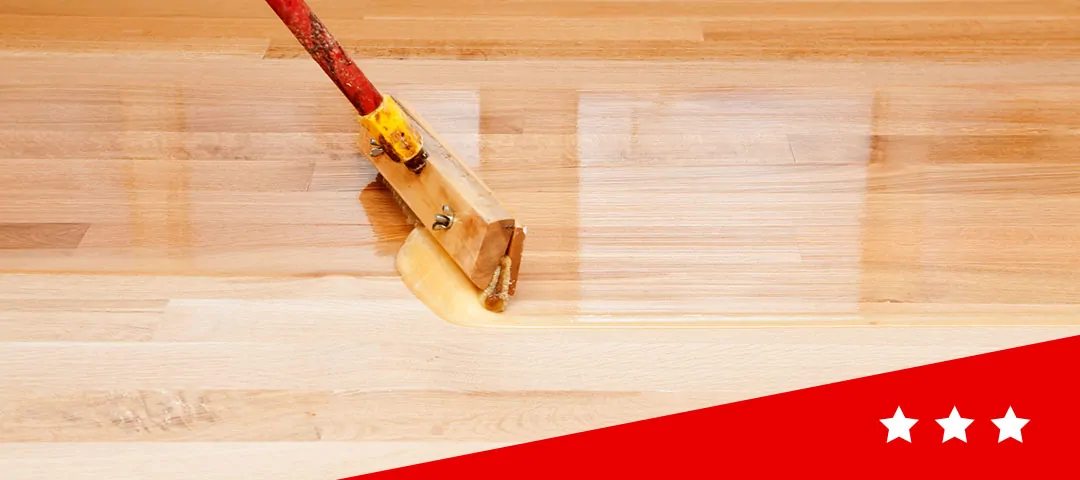Water- vs. Oil-Based Polyurethane: What’s the Difference?
- Published By: District Floor Depot

When it comes to your floors, you want the best. They are an investment, after all, and ensuring you understand how to care for them protects that investment for years to come. That includes proper installation, maintenance, repairs, and seal coats, all of which aid in keeping your floors as nice as possible for as long as possible.
Polyurethane products come in multiple varieties, can help you do just that. This quick guide to polyurethane — including the differences between water- and oil-based polyurethane varnishes — will help you better understand hardwood flooring finishes and how they can be used to protect your next flooring project.
What Is Polyurethane?
Polyurethane is a plastic-based resin used in foams. It can be found in decorative columns, door frames, moldings, padded clothing items, refrigerator or freezer walls, thermal insulation panels, upholstery fabrics, window headers, and more. It comes in several densities, too, including low and high, enabling it to give objects the shape or flexibility they need.
In flooring, polyurethane applications run the gamut from cleaning products, construction sealants, and materials for filling spaces or cavities to adhesives, abrasion resistance, and varnishes. The latter comes in primarily water-based or oil-based varieties, each with its own set of application specifications.
Comparing Hardwood Flooring Finishes: Which One Is Right for You?
Differences Between Water- and Oil-Based Polyurethane
Oil-based and water-based polyurethane finishes have different characteristics that you should be aware of before settling on one. Here’s what to consider:
- Drying time: Both finishes require several coats. Because water-based finishes are thinner, they dry faster, and you may apply many coats in one day. You can also use the room just a few hours after you apply the final coat, though the floor won’t completely cure for about three weeks. Oil-based finishes take four to six hours to dry between coats, and you’ll typically want to wait a few days before using the room. The curing process typically takes about 30 days.
- Smell: While you can’t completely prevent odors while applying polyurethane finishes, water-based finishes have little odor. They are safer to apply and for your family to live with. Oil-based finishes have a more pungent odor and may contain volatile organic compounds. The individual applying the finish should wear the appropriate personal protective equipment, and you’ll want to remove your pets and family from the home while the finish is applied.
- Thickness: Finishings help protect hardwood flooring. Since water-based finishes are thinner, you may need more coats to get sufficient protection. If you’re applying a finish to a high-traffic area or one with lots of furniture, you may want to opt for an oil-based finish for increased scratch resistance.
- Cost: Water-based hardwood finishes are more costly than oil-based finishes, and you’ll typically need more coats for water-based finishes.
Oil-based polyurethane is known in the woodworking world for its distinct odor and longer drying times. Oil is thicker than water, meaning oil-based polyurethane is more durable and lasts longer than a water-based variant. It is also easier to apply, provides a natural finish, darkens the wood, and can give your home’s floors a glossier, shinier appearance.
The downside is that oil-based poly will cake on brushes, meaning users will need to use a thinning agent to clean them after application. Also, when applied directly, oil-based polyurethane can create such a strong barrier that it almost looks like clear plastic. Mixing it with mineral spirits helps to thin it out without dulling its favorable properties, helping create the result most homeowners need.
Water-based polyurethane varnish boasts many of the same properties but has a quicker drying time and less of a heavy varnish smell. It is safer for the environment because it contains fewer chemicals, its containers are recyclable, and spills or excess can be cleaned up with water instead of a thinning agent.
The negatives for water-based polyurethane are minimal, including less heat resistance than oil-based varieties and possible damage when overly exposed to liquids. Its thinner properties prevent it from having the plastic effect, and it might be easier to see brush strokes once applied. Also, it needs to be applied more often than its oil counterparts. Because it’s more natural, water-based polyurethanes usually cost more than oil-based alternatives, too, which is something to consider if you’re a homeowner on a budget.
Choosing Between Different Types of Hardwood Floor Finishes
Some other factors you can consider when choosing hardwood floor finishes include:
- Color: Many people consider their hardwood flooring colors when selecting a finish. If you want to retain the original color of your floors, you may want to choose water-based finishes. They’re completely clear and do not yellow over time like oil-based finishes.
- Scratch resistance: Oil-based polyurethane finishes tend to have better scratch resistance than water-based polyurethane finishes.
- Timeline: When time is an important factor, water-based finishes are often better because they dry quickly.
Consult a Professional
If you have questions or concerns about which polyurethane varnish is best for your floors, or whether you should use one at all, call a trusted flooring expert. The last thing you want is to damage your floors or make a decision without feeling comfortable. An experienced flooring professional will walk you through the best options for your home and help you decide on the next steps.
To learn more about hardwood flooring finishes, contact District Floor Depot. In addition to flooring installation, we also provide sanding and refinishing services to keep your hardwood in top condition. Learn more about our refinishing services today.
